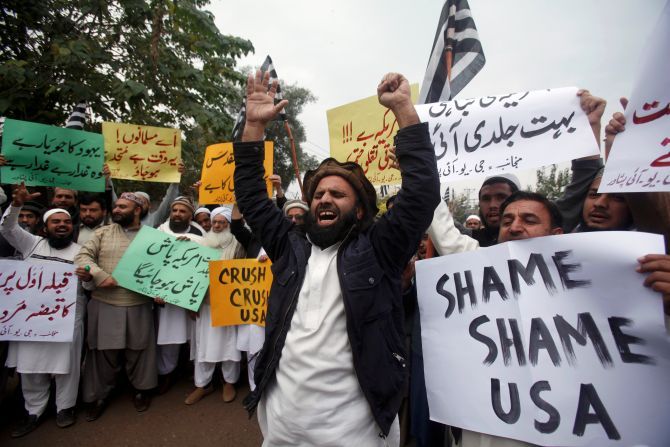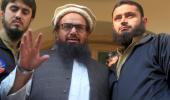'Bolstering India's conventional military capability against China is in America's strategic interest,' says military historian Colonel Anil A Athale (retd).

IMAGE: An anti-US protest in Peshawar, Pakistan, December 12, 2017. Photograph: Fayaz Aziz/Reuters
2018 began dramatically for the Indian subcontinent.
While some Indians were fighting over a 200-year-old battle, the American president decided to call the Pakistani bluff.
In his characteristic style Donald J Trump accused Pakistan of trading lies and being ungrateful for the $33 billion aid Washington had given Islamabad over ten years.
Trump accused Pakistan of helping the very insurgents, the Afghan Taliban and the Haqqani Network, that the Americans are fighting in Afghanistan.
The next day, the US announced a freeze on $1 billion aid that it had promised Pakistan. The Americans made it clear that the suspension applied only to military aid; presumably economic aid will continue.
A freeze in American military aid is not a new phenomenon.
In 1965, after India complained that Pakistan had used American weapons against India in Kutch, the US announced the suspension of military aid to mollify India.
At the same time the US turned a blind eye to the transfer of weapons from Germany, Iran, Jordan and Saudi Arabia to Pakistan during the 22-day war that was fought in September 1965.
US aid to Pakistan was resumed in 1966 after the Tashkent agreement between India and Pakistan.
The second suspension of US military aid occurred in July 1977 after General Zia-ul Haq staged a military coup and overthrew Zulfikar Ali Bhutto's government. This freeze lasted till December 1979.
After the Soviet Union invaded Afghanistan in December 1979, the US not only resumed military aid, but made Pakistan a frontline State in its 'defence of democracy'.
Billions of dollars of military aid flowed into Pakistan during the 1980s, making its military one of the strongest in Asia.
In 1985 the United States Congress through the Pressler Amendment made aid contingent on Pakistan not pursuing its nuclear ambitions. But the US president and its executive branch issued false certificates that Pakistan did not possess a nuclear weapon.
This charade ended only after the Soviet Union left Afghanistan in 1988.
In May 1998, after India and Pakistan conducted nuclear tests, the US imposed economic and military sanctions on both countries. These were removed in 2001 in the wake of the 9/11 terror attacks.
The US and Pakistan again joined the American military effort in Afghanistan against al-Qaeda. It is this latest military aid package that stands 'suspended' (not cancelled).
The reason to recall this history is to make the point that US-Pakistan relations have always had this yo-yo factor.
After Turkey, the Pakistan army forms the pillar of US domination in the Middle East. Even at this time while relations have soured, Pakistan's former army chief General Raheel Sharif heads the Saudi-led military coalition primarily aimed at Iran.
Iran continues to be the focus of American hostility, therefore Pakistan, which is allied with Saudi Arabia, is vital for American interests.
The limited aim of the current pressure on Pakistan is make it give up its policy -- nay addiction -- to 'strategic depth' in Afghanistan for which the Taliban and the Haqqani Network are instruments.
Pakistan has made brave noises of standing up to the US. But if America is to follow this up by cutting off World Bank and IMF assistance, Pakistan's economy can go into a tail spin. China can mitigate the effect only partially. With low oil prices, the Arabs are also not of much help.
Military aid is not the only pressure that the US can exert on Pakistan.
A curtailment of spares for existing military hardware can easily degrade Pakistan's conventional military capability.
The Pakistan air force's frontline fighters, the F-16, need about 16,000 spare parts a year to stay airborne. Any disruption can ground the PAF's F-16 fleet.
After the Shah was ousted in 1979, Iran faced such a situation, and suffered reverses in the decade-long war against Iraq.
Pakistan is ruled by its civil and military elite. These rulers have stashed their wealth in the Gulf and sent their sons and daughters to the US. Even the votary of 'Pakistan First', General Pervez Musharraf's son lives in the US.
If the Americans were to impose travel curbs on senior Pakistan military and civilian officials, it can quickly bring them to heel.
What will be the likely impact on India?
The Americans have been careful to mention only terrorists operating in Afghanistan. Only a fleeting mention has been made of groups targeting India.
But by degrading Pakistani military capability, the US is indirectly helping India.
All these years the Indian armed forces had arms and equipment that were archaic. In 1965 Pakistan already had 155 mm guns; these became available to India only in 1985.
Pakistani small arms, radar, helicopters, guns and anti-tank weapons were always a generation ahead of India's military, thanks to the Americans. Even Pakistan-supported Kashmiri terrorists had better weapons than Indian soldiers.
It is through sheer numbers, jugaad and better military leadership that India prevailed in all the wars with Pakistan.
This situation is set to change in our favour. This is indeed a big plus from the Indian point of view.
Even if Pakistan accedes to the American request and curbs the Haqqanis, the situation is not likely to return to the earlier status quo.
Pakistan is decisively in the Chinese camp and the US needs India to balance China in Asia. Bolstering India's conventional military capability against China is in America's strategic interest.
In a sense the situation has turned topsy-turvy from the days of the Cold War. The sole American interest in India then was that we should not travel further into the Communist camp. Pakistan was already a US ally against the Soviet Union.
The situation today is exactly the opposite. This year, with American backing, India has become a member of the Missile Technology Control Regime as well as the Wassenaar Arrangement that controls dual use technology.
With technology curbs no longer in operation, India can produce high tech weapons on its own. Even with Chinese help, Pakistan cannot match this. China is not a member of these regimes and is miles behind the US in military technology.
All in all, this is a win win for India.
It is no wonder that Pakistan's foreign minister ruefully remarked that the US is talking India's language!










